*Dark Daily Editor, Robert Michel argues the case for more strategic use of pathology tests:
In healthcare across the globe there is an explosion of knowledge from genetic information that is now opening the door for improved diagnostic capabilities.
Pathology labs are getting new technologies that allow for earlier and more accurate diagnosis, improved patient care and better outcomes.
All this means less cost per episode of care as earlier diagnosis can speed up recovery.
The case has clearly been made for ‘precision’ or ‘personalized’ medicine. There are an increasing number of genetic markers that allow doctors to tailor treatments, knowing whether a treatment is likely to be effective.
The cost saving here is obvious, for instance, cancer drugs can often cost tens of thousands of dollars so they should be used only when there is likely to be a benefit. Avoiding the side effects and wasted time is clearly preferable for patient wellbeing too.
However, it is not only genetic tests or new technologies that can be used strategically to save money.
A US analysis* of a change in the use of creatinine testing in hospital inpatients showed that when this simple test was used more diligently by doctors, acute kidney injury was diagnosed earlier. This meant quicker treatment and faster discharge from hospital, freeing up beds and saving hospital funds.
Evidence suggests that there is a case for an increase in HbA1c testing, for monitoring patients who have a diagnosis of diabetes and also for catching the many undiagnosed cases out there.
The expense of treating the complications of diabetes such as organ damage, foot and eye problems, is far higher than the cost of providing regular testing to diabetic patients and testing potential diabetes cases.
Diligent test ordering for these patients is an important first step, but follow up is also vital to encourage patients to attend for testing, retrieve their results and take the necessary action on them.
Patients missing tests or results is all too common and happens for a range of reasons. However, Pathologists have little direct interaction with their patients and lack the opportunity to communicate the importance of following through with tests. Awareness raising initiatives such as Know Pathology Know Healthcare aim to highlight pathology’s essential role in healthcare, and to encourage better health literacy among Australians.
With the current trends in health, for example increasing obesity, higher rates of diabetes, an ageing population, it is important that pathology is utilised to its fullest extent. To be clear – I am not advocating for simply more testing, but for physicians to be strict about following testing guidelines for all patients.
Getting the most from pathology requires strategic funding but there is also a need for effective knowledge sharing. Pathology professionals and physicians need to communicate better.
It is difficult for doctors to stay ahead of advances in pathology and testing guidelines for every possible ailment and disease state they may encounter. Technology and knowledge are moving quickly in pathology, making the expertise of Pathologists a vital resource for treating doctors.
Doctors should be encouraged to use the expertise in the lab, to ask questions and discuss results. Medical labs should also be taking a lead on communicating with clinicians on test updates and ensuring reports are clear and contain the appropriate detail.
In short, working together to provide the right test, for the right patient at the right time is the best way to serve the population, as patients and taxpayers.
*This article is an opinion piece by Robert Michel and was originally published in Medical Observer on 21st November

